Discover Relatively Prime: Stories from the Mathematical Domain
Relatively Prime: Stories from the Mathematical Domain

63 Episodes
Reverse
We are back with a new series in Relatively Prime that we are going to be calling Seminars!
The seminars are going to be going out into the Relatively Prime feed off and on and they will be tackling the big questions about mathematics. In other words the seminars will be more of a meta conversation about what goes on in mathematics and our first conversation is going to be about funding in mathematics.
If you have a question that you want to hear a seminar about please just email seminar@acmescience.com
Joining our host Sam Hansen to discuss funding in mathematics we have Carrie Diaz Eaton (BSky), a mathematician, an associate professor of digital and computational studies at Bates College, and the executive director of the Rios Institute, Drew Lewis (BSky), a mathematician and independent consultant, and Jude Higdon (BSky), the chief operation officers of the Institute for Quantitative Study of Inclusion, Diversity and Equity or QSide (BSky).
Timeline of Executive Actions from the American Institute of Biological Sciences
Resources Mentioned in the Seminar:Breakdown of Federal Mathematics FundingFederal Funding for all Disciplines ReportCruz ReportSilicon Reckoner NewsletterScience Magazine Reporting on Howard Hughes Medical Institute Inclusive Excellence Fellows Program CancellationNIH in Your StateIbberson Spreadsheet Music:lowercase n
Transcript
ACMEScience · Funding
Sorry for the unannounced hiatus that has now lasted for four years, but our host and producer Sam Hansen has had a lot of life events and changes that led them to not be able to devote the time they needed to making the show. We are planning on coming back very soon, but until then please enjoy this episode about the Mathematics of Voting from the podcast Carry the Two made by the Institute for Mathematical and Statistical Innovation where Sam is the new Director of Communications and Engagement.
Download Episode
ACMEScience · RelPrimeCt2 Mix
——————–
IMSI is very proud to announce that Carry the Two is back and with a new co-host, IMSI’s new Director of Communications and Engagement Sam Hansen!
Subscribe: Apple Podcasts • Spotify • RSS
We in the United States are deep in the middle of a major national election, and over half of the world’s population also have elections in 2024. This is why Carry the Two is going to focus on the intersection of mathematics and democracy for our new season.
In this episode, the first episode of our mathematics and democracy season, we speak with mathematician Ismar Volić of Wellesley College and Director of the Institute for Mathematics and Democracy and Victoria Mooers, an economics PhD student at Columbia University. We discuss what mathematics has to say about our current plurality voting system, how switching to preference ranking votings systems could limit polarization and negative campaigning, and why too much delegation causes problems for those pushing for Liquid Democracy.
Find our transcript here: Google Doc or .txt file
Curious to learn more? Check out these additional links:
Ismar Volić
Making Democracy Count: How Mathematics Improves Voting, Electoral Maps, and Representation
Institute for Mathematics and Democracy
Victoria Mooers
Liquid Democracy. Two Experiments on Delegation in Voting
Follow more of IMSI’s work: www.IMSI.institute, (twitter) @IMSI_institute, (mastodon) https://sciencemastodon.com/@IMSI, (instagram) IMSI.institute
Music by Blue Dot Sessions and lowercase n
The Institute for Mathematical and Statistical Innovation (IMSI) is funded by NSF grant DMS-1929348
On this episode of Relatively Prime, Michole Enjoli and Noelle Sawyer take over for Black in Math Week. They talk to Brea Ratliff and José Vilson, two Black math educators, and discuss what it’s like to be Black in math, what they would say to people making common false statements about Black students in math, and better hopes and dreams for Black students.
Black in Math week is November 8th – 13th, 2020! It’s a week on Twitter to celebrate community among and uplift Black mathematicians. Check us out @BlackInMath for updates!
Brea is currently pursuing a PhD at Auburn University in Math Education. She is the founder of and CEO Me to the Power of Three and is a past president of the Benjamin Banneker association.
José is located in New York City and is the founder and executive director of EDUcolor. He is currently pursuing a Ph.D. at Teachers College at Columbia University in Sociology and Education.
We talk a bit about Afrofuturism in this episode. If you’re interested in checking out more on Afrofuturism, try SpaceBox, a STEM escape room to save astronauts from a virus, and this special minizine from Bitten Magazine!
Download Episode
Music:Kirshmusic
Transcript:
Michole:
This is Relatively rime Black in Math Week in the mathematical domain. I’m one of your host, Michole Enjoli.
Noelle:
And I’m Noelle Sawyer
Noelle:
We’e here as a part of Black and Math Week to talk to some Black math educators. I’m actually an assistant professor of math at Southwestern university in Georgetown, Texas. So I, myself, am a math educator, I’m from The Bahamas and I’ve also got a few teachers in my family line there. So education has got a special place in my heart.
Michole:
And again, Michole Enjoli, I’m a mathematician, educator ,and STEM edutainment producer. I originally hailed from Atlanta, Georgia, and Seattle, Washington, but now I’m in Ann Arbor working on my PhD in math education. I also have a lot of educators in my family and I always like to make it be known that I’m an educator before mathematician.
Noelle:
I talked to Bria Ratliff for this podcast and I asked her how she introduces herself to strangers. If you’re sitting next to a stranger in the before times, right. When we did that and someone and someone asked you, like, what do you do? How do you answer them?
Brea:
Um , generally I say that I’m a mathematics educator and can we go back for a minute? Cause the before times, and the Hunger Games was reference just really gives me life right now. (laughs) Um, that that pretty much is mathematics or STEM educator, I think is probably the best collective term for all the things that I do. And I’m involved with. I have been an administrator and a coach and currently delving deeper into research and have been a research coordinator and whatnot for a while. And I have my own business also, I’m consulting on mathematics and STEM, but at the heart of what I do, I am a mathematics educator.
Noelle:
Brea is in the math education doctoral program at Auburn university. Right now. She’s also the founder of Me to the Power of Three, which specializes in curriculum development and designing educational programs. They’ve done work for the Dallas Cowboys stadium and she’s a past president of the Benjamin Banneker association.
Michole:
And I took the time to talk to José Bilson and I also asked him, because he lives in New York city. If he’s ever on the train or walking down the street, how does he introduce himself as strangers?
José:
Usually I tell them my name is José Vilson. I’ve been, before this year I was a math teacher for the better part of 15 years. In addition, I am also the executive director of EduColor an organization dedicated to race, class and education, but also as a proud father, husband, and any number of other roles that I take on a daily basis.
Michole:
And Noelle, let me tell you, José is a dope math educator, but he’s also the founder and executive director of EduColor color. And he’s currently pursuing a PhD at Teacher’s college at Columbia university in sociology and education. But before he was doing his PhD, I thought he was already a doctor because we met a couple of years ago at the CIME conference at MSRI. So CIME is a conference in mathematics education and MSRI is a mathematical sciences research Institute. And for anyone who’s listening, I’ll say this again at the end, please follow José on Twitter. You will be enlightened every single moment,
Brea:
Even though Brea and José both have these really cool jobs and backgrounds, I was kind of curious
Michole:
What were you’re curious about?
Brea:
Whether or not people still make the statement that all math people are tired of hearing. Do people still respond and say, Oh, I hate math. (Laughing)
Brea:
I’m sure you hear that all the time. It’s, it’s, it’s still such a pervasive thought across, um, society. So I think we really have to do better about the messaging with that. Admittedly though, there is, there is some eliteism that does come with saying that you are a math person and I think we’d be lying if we didn’t recognize that. But at the same time, if we’re wanting more people to come into the mathematics space, then we have to really find ways to help them understand. There is really no such thing as a math person. That’s that is false.
Michole:
You know, I’ve always been a solidarity with folks who hate math. Like even though I know I personally have done well, well, I can only say that up until undergrad, but for the most part I’ve done well in math. It’s really reasonable to know why people have hard feelings around it. Now I think about a lot of the violence that can happen in a math classroom, especially, especially for Black students in America. You know, their bodies are often looked at in similar ways that we see on the streets. We think about police reform and police brutality that’s happening to Black people.
Noelle:
So when we talk about policing Black bodies in the classroom, like, are we also talking about the actual police here.
Michole:
In some instances we are. And if you were to do a quick YouTube search, which I honestly hate to put this out here to even have to put anyone to witnesses this, but you can find several videos where there are police officers, throwing Black students to the ground in a math classroom, in a math classroom. Why the police even there in the first place in these Black communities, and not even always in Black communities, you know, and we see that happening, but there’s also things happening in a way that we’re teaching math education. That’s very behavioral and policing the way that Black students show up and do mathematics in the classroom. There’s a study that I’ve read before in my own research that shows, the second grade teachers were significantly more likely to judge their Black female students’ math abilities solely on their behavior. Second grade Noelle.
Noelle:
Wow
Michole:
they said the students were getting up moving or whatever, and they’re not answering their questions all the time. We talking about second graders who were always running around, having to use the bathroom every 10 minutes. They were being policed way more in that way than on their knowledge. So me and José talked about this in relation to his work that he does with EduColor.
José:
In the service of Black children. I think that’s pretty much where we center so much of our work because we work directly with them and specifically talking about how anti-Blackness shows up even amongst people of color, generally, even amongst Black folks, right? The idea that for example, our pedagogies have to be super regimented and make sure everybody like, sits in rows in aisles to address those kids, make sure that they like follow whatever that, that like a champion nonsense is. And I know the name of it. I just rather not validate it, but I think, I think it’s just so fascinating because like so many of the schools that educators of color are being pushed towards now are some of the same schools that their business model is based off segregation. It’s very much like we will serve your children. We will give them resources through our hedge fund managers. But that in turn you have to sacrifice their liberties. You have to sacrifice the idea that they deserve to be able to be in control of their hands and control their eyes and control of their own voices. Like they have to sacrifice those levels of control. And it’s not to say that public schools don’t often have similar situations, but it is to say that the things that you can get away with when it’s not as accountable to the public, you’re able then to push down Black kids because you know that the general public doesn’t really care that much about Black kids humanity, as much as they care about pretending like they’ve solved some sort of gap.
Noelle:
And honestly, how could they have solved anything when here we are during COVID and surprise, all of these problems are even worse now. And Brea also had something to say about that.
Brea:
There are children every day who are just getting further and further behind academically because COVID has exacerbated this opportunity that, that we’ve had for a very, very long time. And disproportionately it is affecting Black and Brown children. It’s affecting children who are in poor communities. But the thing is we, we, we knew that. And if we, the frustrating thing is that we’ve, many of us have been trying to tell people that and talk about how we could address these issues. Well, before we got here and we’re still here, um, (sigh).
Noelle:
I’ve found that oftentimes people who don’t actually want to help think that by acknowledging an issue exists, like they have done their part, (laughter) Right? Like, Hey, yes, you, what I do agree. I see that there are these problems and the
On this episode of Relatively Prime Samuel is joined by Brittany Rhodes the creator of the amazing monthly mathematics subscription box Black Girl Mathgic. They discuss where the idea of the box came from, what comes in the boxes each month, and why everyone benefits when young Black women are centered in mathematics. If you want to help Brittany and Black Girl Mathgic reach more people you can help out by donating a box.
ACMEScience · Relatively Prime: Black Girl Mathgic
Download the episode
Music:Broke For Free (Night Owl) (Only Instrumental)
[The podcast episode file has been update to remove repeated narration segments]
On this episode of Relatively Prime Samuel is joined by Brigitte Stenhouse of the Open University to talk about the life and times of Mary, and William, Somerville.
Download the episode
Music:Lowercase n
On this month’s Relatively Prime Samuel shares three scenes from the life of Benjamin Banneker. One about a clock, one about a solar eclipse projectsion, and one about a puzzle. You can learn more about the life of Benjamin Banneker by checking out the book The Life of Benjamin Banneker by Silvio Bendini which was essential in the production of this episode and it is available to borrow for free on the Internet Archive or if you prefer a physical copy your library may have it on hand and if they do not the amazing system that is Interlibrary Loan should be able to provide for you.
Download the Episode
Music:Chris ZabriskeRodrigonzálezGriffin Lundinᕲi̾r̾੮ Porcelai̾n
Transcript:
3 Scenes from the life of Benjamin Banneker
Scene 1: The Clock
It was only the second timepiece he had ever seen. And, to those of us alive today, the first we would have thought of as such, as this was a pocket watch and the other a simple sundial.
That Benjamin Banneker had never seen a watch before is not that surprising. After all he was a teenaged free African American man in the colony of Maryland in either the late 1740s or early 1750s. While there were a number of clockmakers who provided their works to farmers in the Chesapeake region, it will likely not come as a surprise that a family where the father is a freed slave and the mother the daughter of a freed slave and a formerly indentured servant were not among those clockmakers clients, though the family’s tobacco farm did allow them to be self-sufficient. The most likely thing is that Benjamin found a merchant or a traveler who not only owned a pocket watch but was willing to let a precocious free young black man take a good long look at it.
There is no historical evidence of what exactly Benjamin did when he set his eyes upon the second timepiece he had ever seen but we can make some educated guesses.
We can guess that he was able to get a good look at workings within. We can guess that he felt fascinated by these workings. We can guess his mind raced trying to understand how such workings were able to keep time so well that they could be relied upon. We can guess he wanted a clock of his own.
We can make those guesses because of what we know.
We know that after seeing the pocket watch Benjamin began to draw out the internal workings of gears and wheels and springs. We know he then worked on calculating the sizes and ratios needed to make a clock function correctly. And we know he used those drawings and calculations to make a clock all his own.
Fashioned primarily out of wood he carved himself, up to and including the gears, the clock Benjamin Banneker designed and built at 21 worked until he died at 74.
Scene 2: The Projection
More than 30 years of working the farm later Benjamin Banneker learns about, and quickly falls in love with, astronomy. At first it is only through occasional discussions with neighbor and noted amateur astronomer George Ellicott, likely with some nighttime telescopic adventures.
Never one to do things in half measure though, Benjamin wanted more. Which he got in 1788, when George offered to lend to him a telescope, some drafting instruments, and many astronomical texts. George also offered Benjamin lesson to help him through the texts and to learn to use the instruments. These lessons turned out to be unnecessary as Benjamin took to his Astronomical studies so vigorously that he worked through the texts before George to make his way back from an extended business trip.
Benjamin did not stop with going through some texts, no he moved right on to practical Astronomy. As well he should have considering it led him, a free African American man, in the newly minted state of Maryland to publish 6 Almanacs from 1792-1797 and to have a correspondence with Secretary of State Thomas Jefferson. But those happened later, and while impressive and great achievements there is a smaller one which tells us just as much about Benjamin Banneker.
Within the first year of receiving the texts and tools from George, Benjamin put to himself the task of making a projection of an eclipse of the sun. Using the tools at hand, his newly found knowledge and his skill at logarithmic calculation he completed his task which he eventually he sent it along to George Ellicott who was still away on business. George was understandably stunned that someone with whom he had left some books but not provided the lessons which should have been needed to understand them had produced such a work, so much so that the very small error in calculation the projection contained did nothing to lessen its sheen. Upon receiving George’s reply though Benjamin did not agree, he was distressed that he had made any error at all and endeavored to determine how such a thing could have happened. Which of course he did.
It turned out that Benjamin was using two books, one from James Fergusen and another from Charles Ledbetter, both of which had correct methods for projecting solar eclipses but which could lead to errors if they were used in conjunction with one another. Suffice it to say Benjamin did not make further errors in projecting solar eclipses.
Scene 3: Puzzle of the Dog and the Hare from from George Hopkins recorded, and solved, by Benjamin Banneker
When fleecy skies have Cloth’d the ground
With a white mantle all around
Then with a grey hound Snowy fair
In milk white fields we Cours’d a Hare
Just in the midst of a Champaign
We set her up, away she ran,
The Hound I think was from her then
Just thirty leaps or three times ten
Oh it was pleasant for to see
How the Hare did run so timorously
But yet so very Swift that I
Did think she did not run but Fly
When the Dog was almost at her heels
She quickly turn’d and down the fields
She ran again with full Career
And ‘gain she turn’d and the place she were
At every turn she gain’d of ground
As many yards as the greyhound
Could leap at thrice, and She did make,
Just six, if I do not mistake
Four times She Leap’d for the Dogs three
But two of the Dogs leaps did agree
With three of hers, nor pray declare
How many leaps he too to Catch the hare
Just Seventy two I did Suppose,
An Answer false from thence arose,
I doubled the Sum of Seventy two,
But still I found that would not do,
I mix’d the Numbers of them both,
Which Shew’d so plain that I’ll make Oath,
Eight hundred leaps the Dog did make,
And Sixty four, the Hare to take
That is all the time we have for this episode of Relatively Prime. If you want to learn more about the life of Benjamin Banneker may I suggest Silvio Bendini’s The life of Benjamin Banneker which is available to borrow on the Internet Archive or you can check your local public library and if they do not have it on hand may I suggest the amazing system that is Interlibrary loan. The music on this episode is from Chris Zabriske, Rodrigo Gonzalez, Griffin Lundin, Dirty Porcelain you can find links to their work in the show notes for this episode on RelPrime.com
Also I want to be sure to thank all my patrons on Patreon. Without y’ll this episode and the lat 40 or so could not have happened so thank you. If you want to support the show like they do you can head over to patreon.com/relprime and pledge whatever you can afford per episode.
Finally RelPrime is licensed under a Creative Commons attribution share-alike license so you can feel free to do whatever you want with the sounds on this episode as long as you say you got it from Relatively Prime and that you license it in the same way
Thank you all for listening and like the month before last and the month after this one I hope you have a matheriffic month. By y’all.
In this live episode recorded at the 2020 Joint Mathematics Meetings in Denver Samuel Hansen talks about the truth behind the stories we all tell in mathematics. In order to do this they will investigate the actual facts of the Galois narrative, have a conversation about where and when the decimal point appeared with Glen Van Brummelen of Quest University, and play a game of 2 lies and a truth with some people in the audience.
2 Lies and a Truth Slide
The podcast was recorded live on the occupied land of the Arapaho and Cheyenne Nations. Taken finally through violence in the Sand Creek Massacre. Colorado is also the current headquarters of the Southern Ute and Mountain Ute Tribes. There was also parts recorded on the occupied lands of the Anishinaabeg (including Odawa, Ojibwe, and Boodewadomi) and Wyandot tribes.
Download the Episode
Music:lowercase nSteve O’Brien
To wrap up the year 2019 Samuel Hansen is joined by Katie Steckles and Christian Lawson-Perfect of Aperiodical.com to discuss some of the big stories from the world of mathematics this year.The stories they discuss include Hannah Fry’s Royal Institution Christmas Lectures, Karen Uhlenbeck’s Abel Prize, year two of the Big Internet Math Off, a new multiplication algorithm, a new pi digits record, 33 and 42 as the sum of three cubes, and advances toward solutions for Collatz and Riemann.
Download the episodeMusic:lowercase n
On this episode of Relatively Prime we explore the thoughts of authors of general audience mathematics books. Specifically they share why they started writing, how they choose their topics, and how they think about their audiences. It features clips from interviews Samuel Hansen conducted with Colin Adams, Ivars Peterson, John Allen Paulos, Jordan Ellenberg, Dave Richeson, Matt Parker, Steve Strogatz, and Alex Bellos.
Download the EpisodeMusic:Lowercase nZombie Horde Sound Effect:Mike Koenig
For this episode of Relatively Prime Samuel decided that instead of speaking to a guest they would instead talk about the research they are conducting now that they are a Mathematics & Statistics Librarian. This research looks into how the citations of mathematical publications age over time, and its discussion includes a first for Relatively Prime – Data Sonification! These sonifications were created using Jonathon Middleton’s website Musical Algorithms (you hear more about Jonathan and this site on the Relatively Prime Season 1 episode The Score)
Median Citation Age
Median Oldest Citation
Download the episode
Music:Lowercase n
On this month’s episode of Relatively Prime Samuel Hansen speaks with Professor Mike Spivey from University of Puget Sound about his interactive fiction game A Beauty Cold and Austere. They discuss how interactive fiction and mathematics work together, some of the mathematical puzzles in the game, and just what easter eggs might be hiding within the game.
You can play A Beauty Cold and Austere here.
Download the Episode
Music:SepgilBroke for Free
A Beauty Cold and Austere Voiceover:Bree PrehnKT Howard
This episode is a bit of a blast from the past. Samuel has recently been going back through some of the old episodes from season 1 and while there were listening to The Score they realized that while the story about Robert Schneider and the non-Pythagorean scale was great it barely scratched the surface of amazing things Robert talked about in the interview. Upon registering to the original conversation, 7 years after it was recorded, Samuel realized not only did the story barely scratch the surface, the rest of the interview was absolutely fascinating. Robert’s mind works in amazing ways and the connections it draws between mathematics and music and art and life need to be heard. There is a reason Samuel considers Robert to be one of their favorite people in the world to talk to. So, sit back, listen, and enjoy Robert Schneider from Apples in Stereo, The Elephant 6 Record Co., and freshly minted mathematics PhD (a degree which had just been begun when this interview was conducted).
Download the episode
Music:Apples in Stereo
On this episode of Relatively Prime Samuel Hansen is joined by fellow podcasters and friends Katie Steckles and Peter Rowlett of the Aperiodical to talk about their new mathematical podcast Mathematical Objects. They discuss about where the idea for the podcast came from, how talking about objects can lead to conversations which range from research mathematics to history and back again, and it even features two episodes of their show, one about a shirt and other about a piece of citrus. Once you hear it you will want to subscribe, which you can do here.
Download the episode
Music:Kevin MacLeod
On this episode of Relatively Prime Samuel speaks with the founders, Sylvia Bozeman of Spellman College and Rhonda Hughes of Bryn Mawr, a current director, Ami Randunskaya of Pomona College, and a former director, Ulrica Wilson of Morehouse College, of the Enhancing Diversity in Graduate Education (EDGE) program. They discuss why EDGE was started, how it transformed from a program to help young women entering graduate school into a multi-academic generation mentoring community, and its impact on mathematics. If you want to support the amazing work EDGE does you can donate here.
Download the episode
Music:Lowercase n
If a person is going to become a mathematician it is important for them to be able to see examples of people like themselves who have already made that journey. All too often this type of representation is few and far between for many mathematically inclined black and brown young people. On this episode of Relative Prime Samuel Hansen is joined by the four co-creators of Mathematically Gifted & Black: Candice Price, Erica Graham, Raegan Higgins, and Shelby Wilson. Together they talk about why they wanted to tell the stories of a wide breadth of black mathematicians lives, the importance of representation, how some of the stories they are still having to tell in 2019 show how much mathematics has to grow, and potentials paths for that growth.
Download the Episode
Music:LocoflopNina Simone
Here on Relatively Prime we have discussed mathematical novels and poetry and music and even featured mathematics sketches, but we have yet to talk movies. That oversight is going to rectified on this episode by featuring two interviews Samuel had done with people who have made movies where mathematics is the star.
First up is Samuel’s conversation with the creators of the Flatland and Flatland² Sphereland animated movies writer and director Dano Johnson and the producer Seth Caplan
Then you will here Samuel’s interview of Christopher Boone, the creator of the Kickstarter funded mathematics movie Cents. Quick disclaimer, Samuel was one of the funders of the Kickstarter.
Download the Episode
Music:Lowercase n
On Relatively Prime we talk a lot about mathematicians and their research, but it has been a long time since we have talked about an absolutely integral part of how people end up becoming mathematicians and doing research…Math Teachers. After all if there were no math teachers then who would first tempt us into the world of mathematics with wondrous things like factoring, which is totally what got Samuel hooked. Hey don’t look at them that way, they just love a good difference of two squares quadratic.
On this episode of Relatively Prime Samuel speaks with mathematics teacher Jo Morgan. They discuss how Jo went from banking to teaching, how twitter totally changed Jo’s teaching practice, and the work Jo does helping teacher to find resources to use in their teaching. To learn more about Jo follow her on twitter and check out her blog Resourceaholic.com.
Download the Episode
Music:Lowercase n
Samuel has been in the middle of a big move this month, more on this in upcoming episodes, but they did not want you to be without a mathematical podcast to end the old and start the new year so here is a year in review episode (with a special twist)x from Samuel and Peter Rowlett’s old podcast Math/Maths.
From the original Math/Maths description:
In a traditional move for the start of January we attempt a review of the year. In an untraditional move, we choose the year 1811. Samuel and Peter weren’t able to speak directly because of the ongoing tension following American independence and the brewing Anglo-American war of 1812, but they cover some mathematical hot topics and the work of several contemporary mathematicians, including Carl Friedrich Gauss, Joseph Fourier, Mary Sommerville, Joseph-Louis Lagrange, Pierre-Simon Laplace, Siméon Denis Poisson and Marie-Sophie Germain, plus the tale of a mathematician born this year: Évariste Galois.
Links:
Mathematics Chronology for 1800 to 1810
Mathematics Chronology for 1810 to 1820
Math/Maths History Tour of Nottingham – George Green: Miller, Mathematician, and Physicist
Carl Friederich Gauss
Joseph Fourier
Mary Sommerville
Joseph-Louis Lagrange
Pierre-Simon Laplace
Siméon Denis Poisson
200 years of Poisson’s ratio
Marie-Sophie Germain
Evariste Galois
Music by Lucas Gonze
Download the Episode
This bonus episode of Relatively Prime features a live podcast recording from 2018’s Annual MathsJam Gathering. This live podcast featured segments from Math/Maths, Wrong But Useful, Talkdust, Strongly Connected Components/Travels in a Mathematical World/All Squared, The Aperiodcast, Relatively Prime, Taking Maths Further, and a surprise bonus show. It was a blast to record and hopefully also a blast to listen to.
The Aperiodical did a more complete round-up of the live podcast which you can read here.
Download the Episode
Music:
Lowercase n
Welcome to the fourth and final episode of the Cycle of Mathematics mini-series from Relatively Prime. In this mini-series we are covering mathematics from its start as an idea to its publication to it inspiring the cycle to start anew.
In this this episode we arrive at the inspiration step of the cycle. Specifically we hear from Michelle Girvan from the University of Maryland on how the Watt-Strogatz paper on small world networks discussed in the first episode of this mini-series helped motivate a definitely not insignificant amount of Michelle’s research.
Stayed tuned for to this feed for a special bonus live mathematics podcast recorded at MathsJam 2018 which will be dropping in a couple of weeks. It is a weird one and I think y’all will enjoy it.
Download the Episode
Music:
ARSY
LOCOFLOP




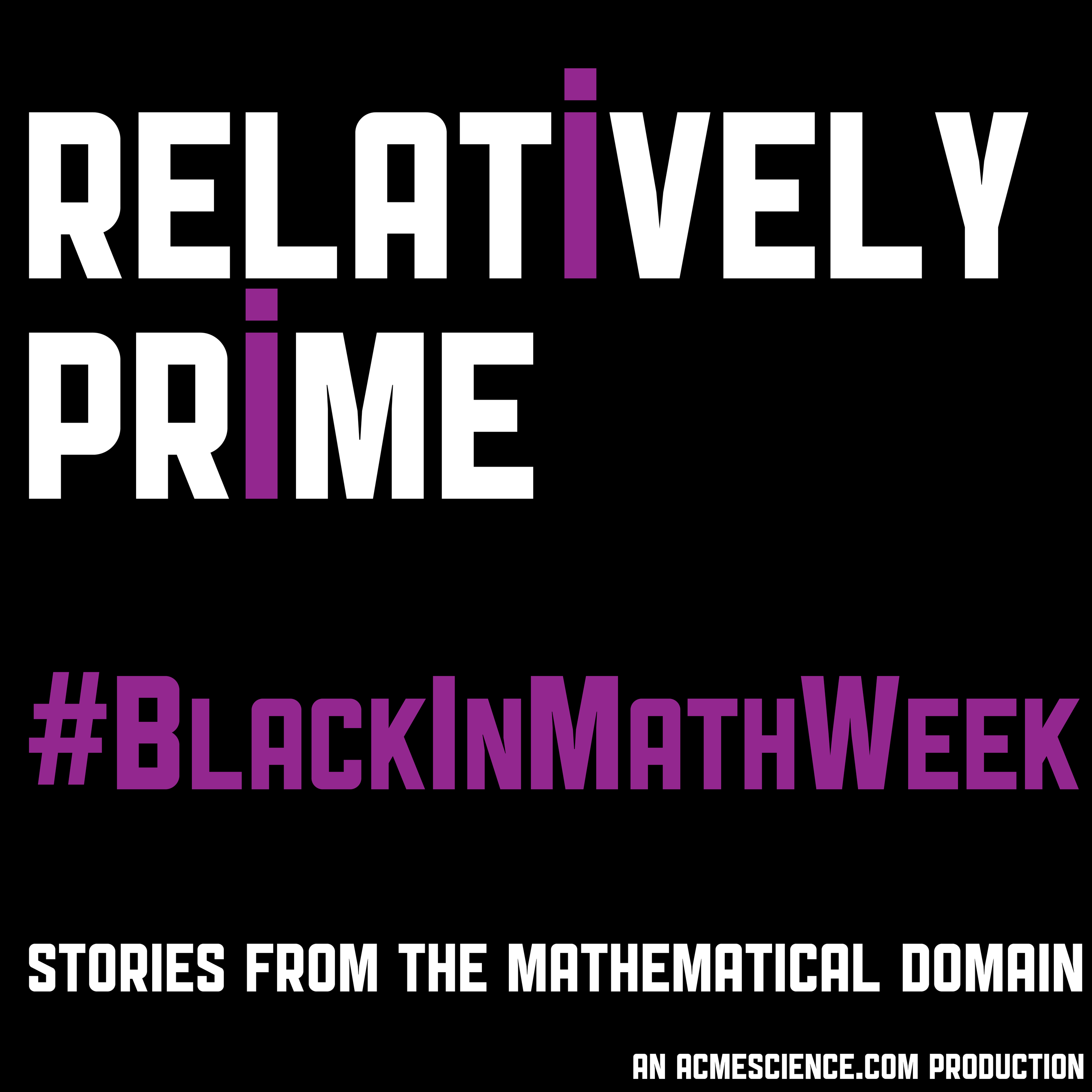
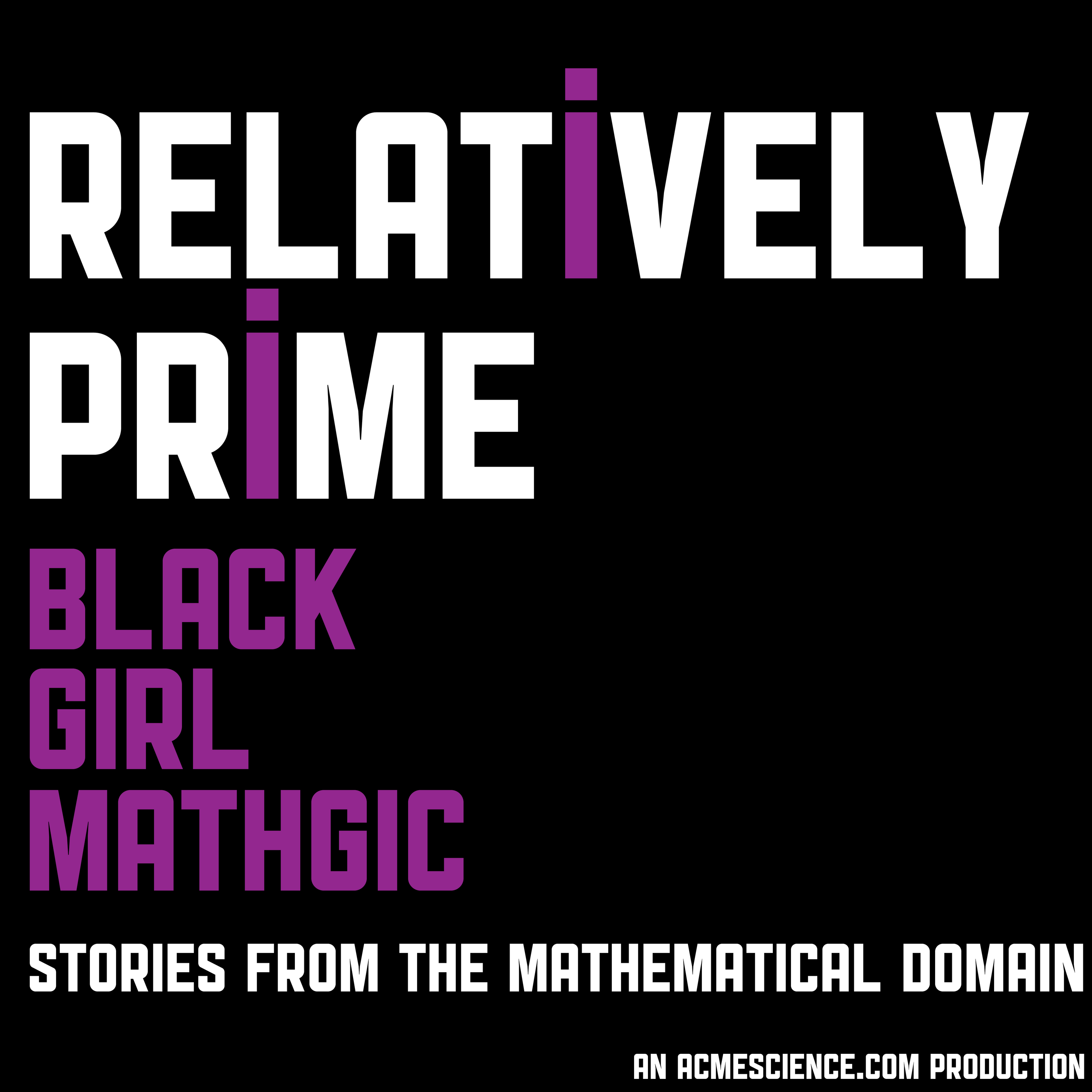
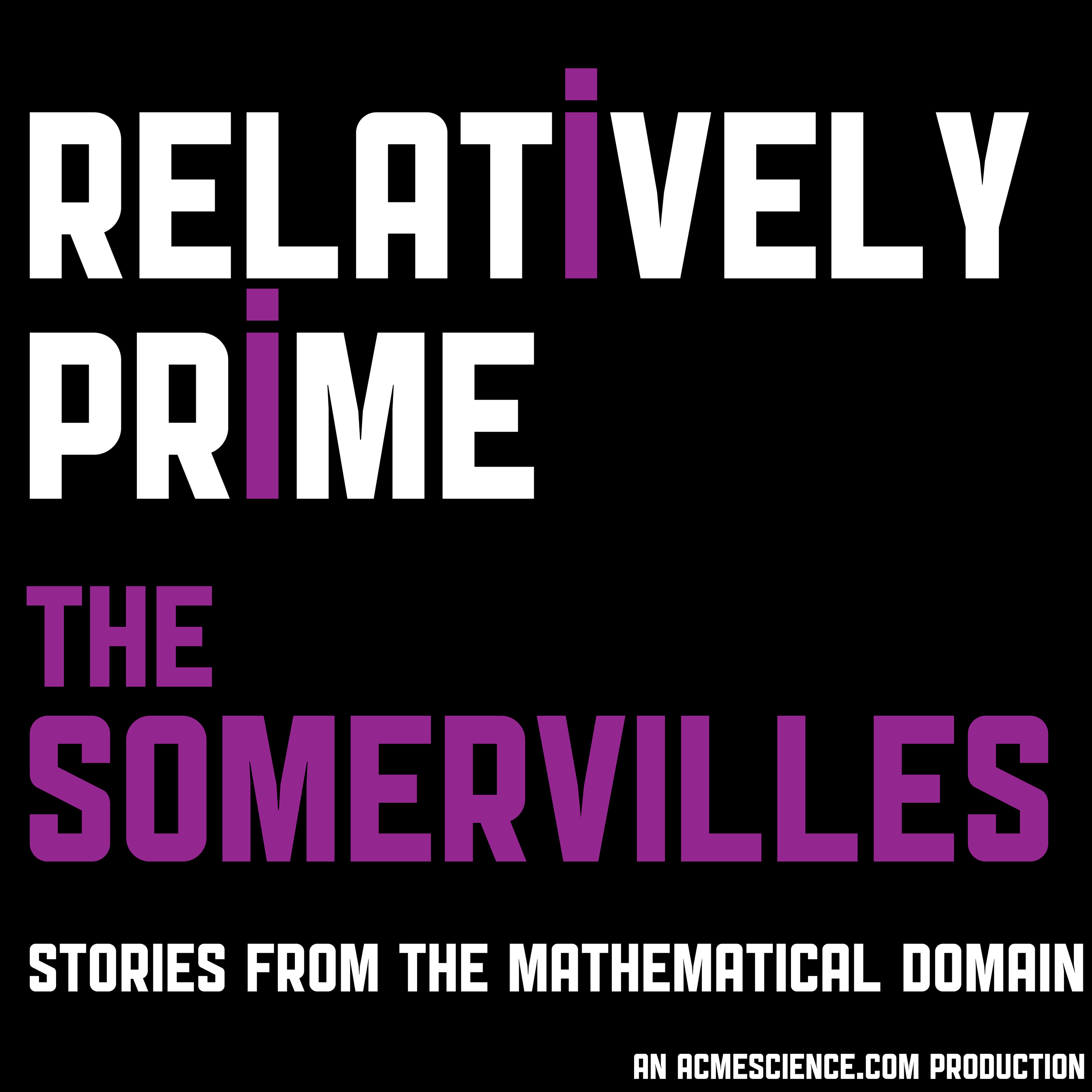
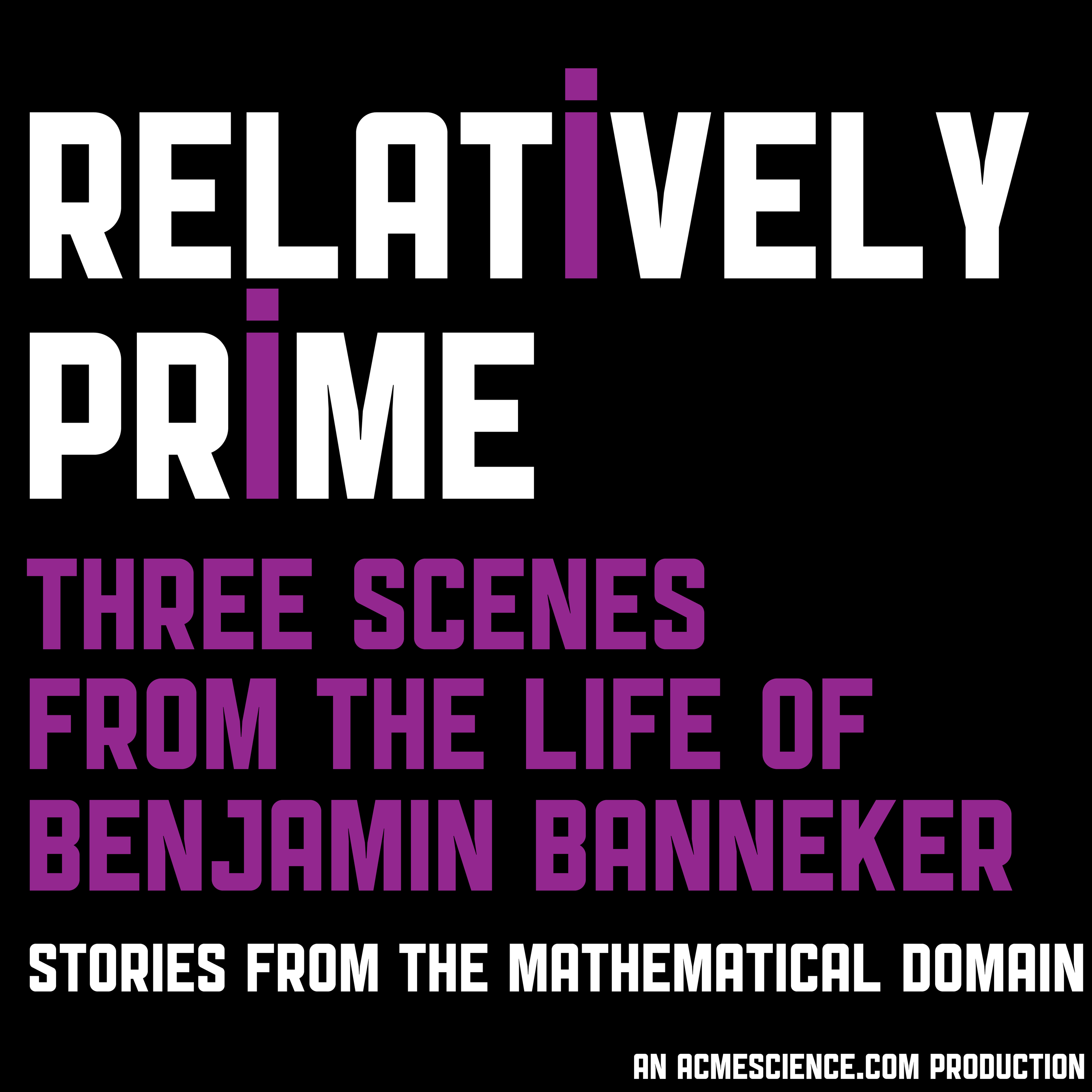


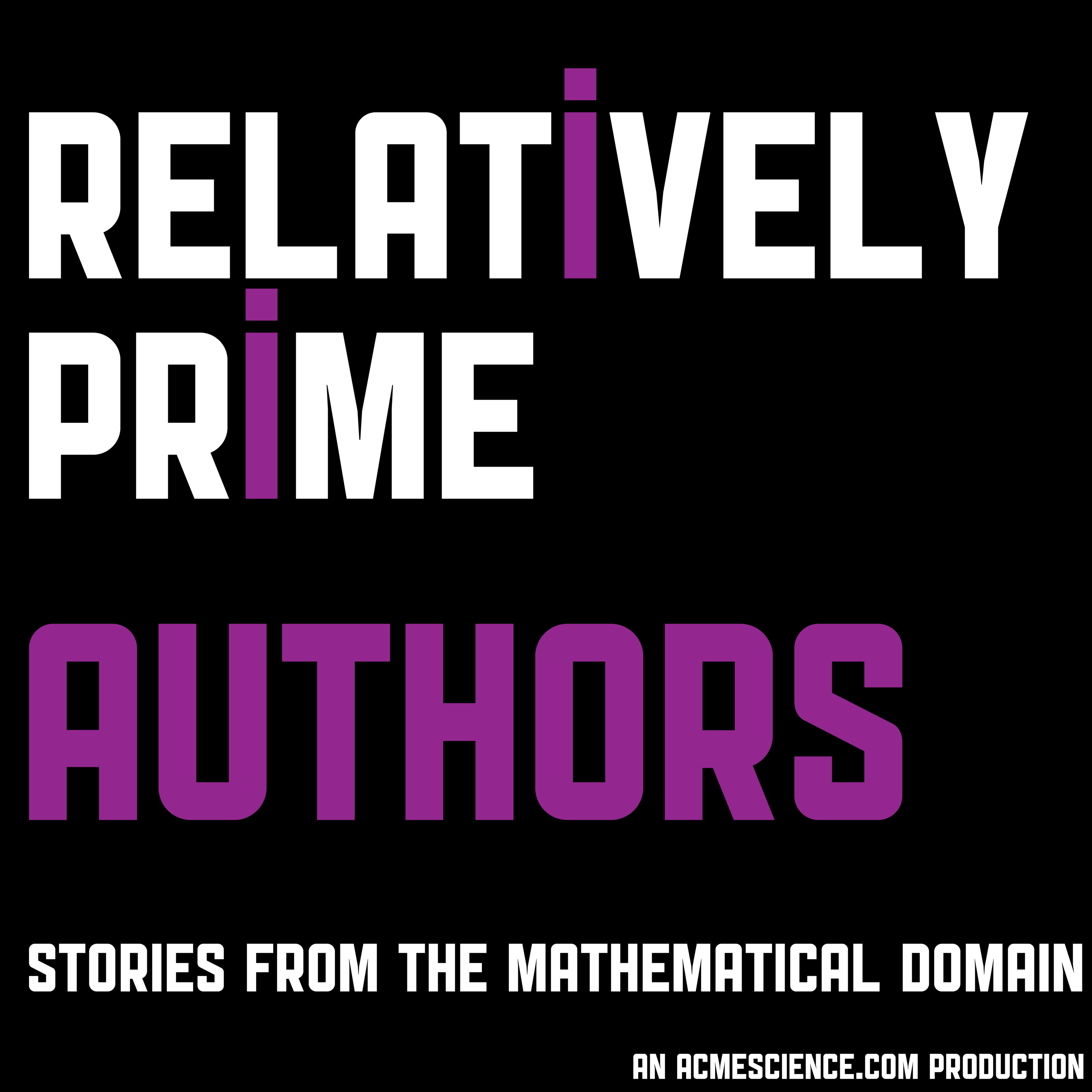

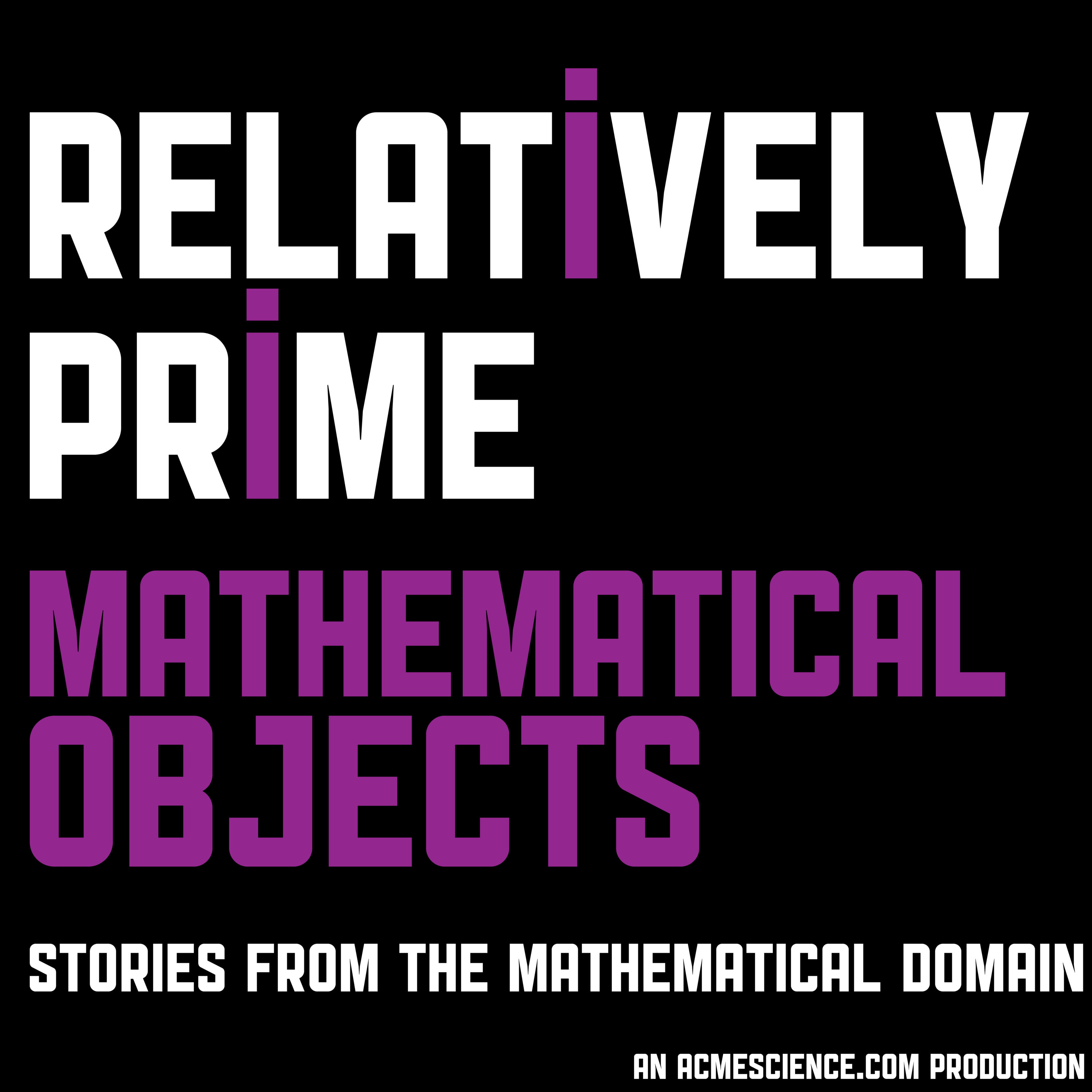
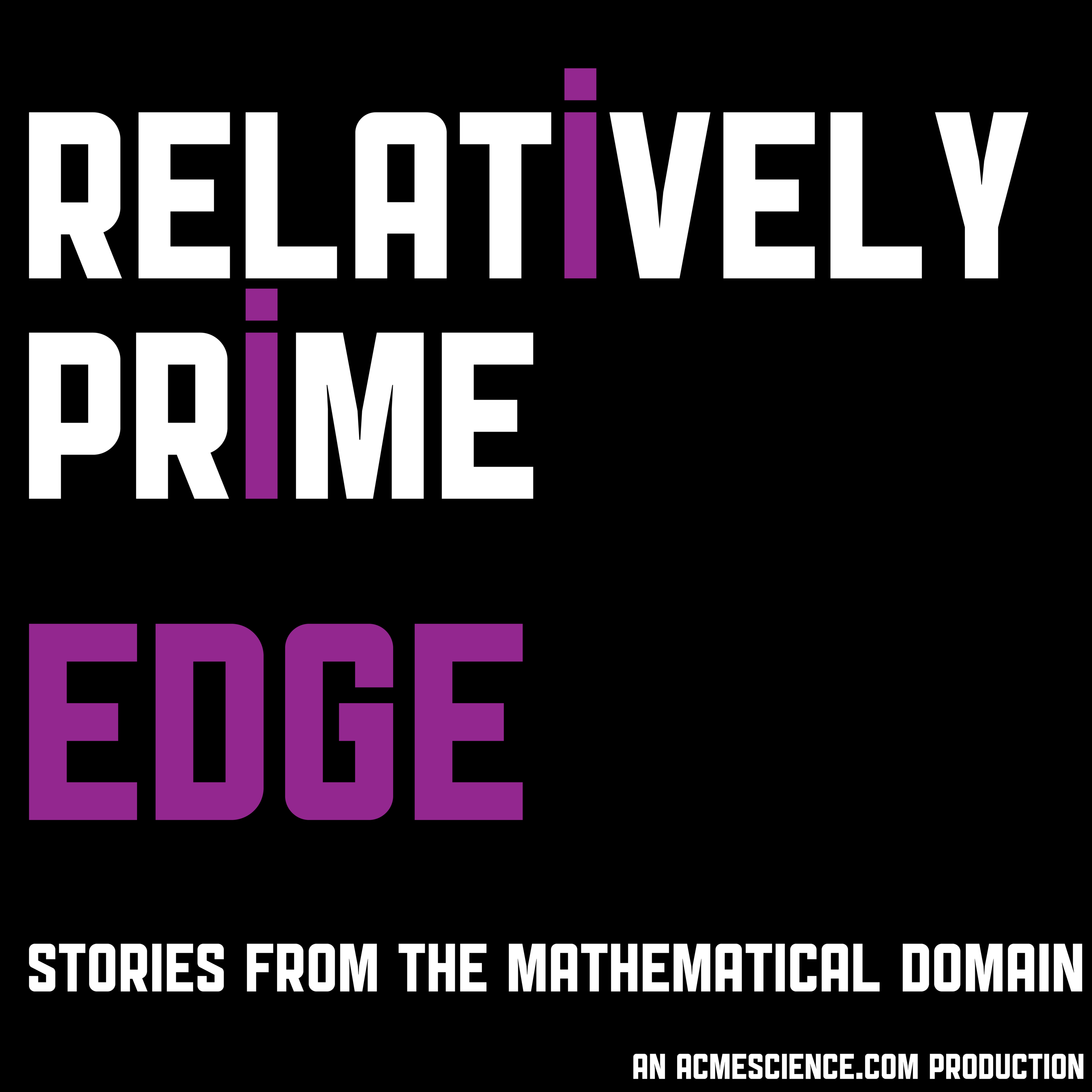
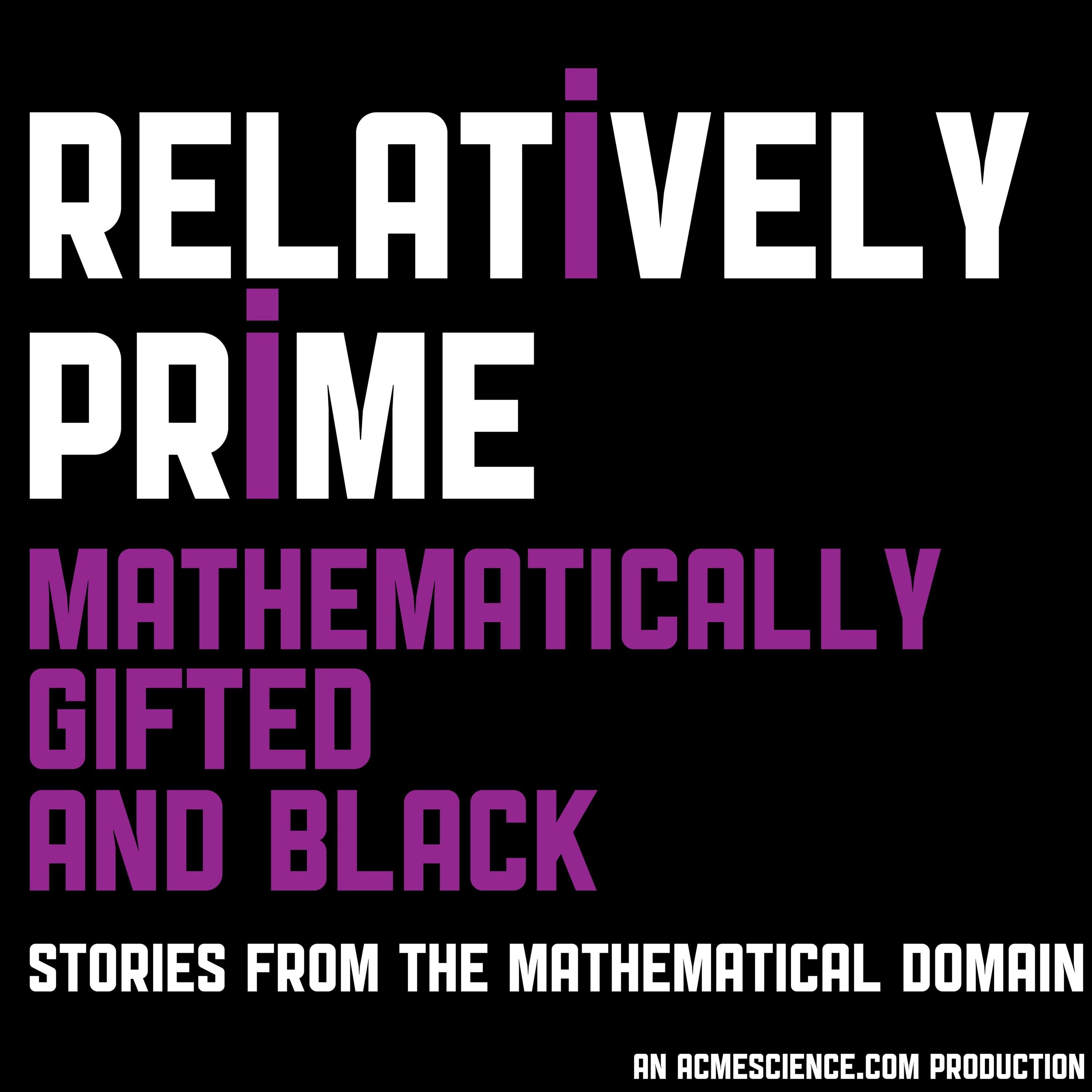
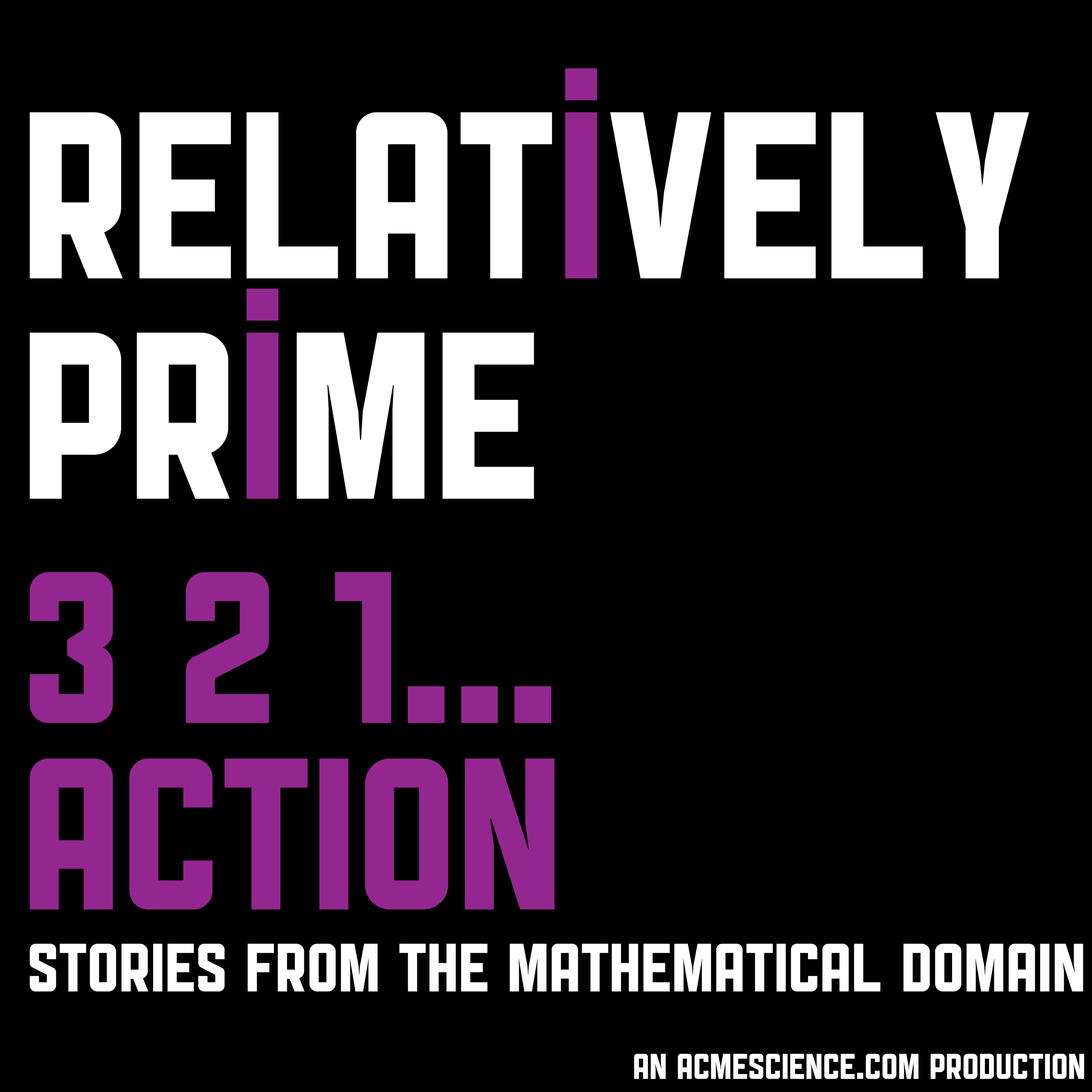



I just recently discovered your podcast and have started listening to the very first couple of episodes. So far, I habe found them to be a fairly enjoyable way to keep my mind active during my daily 3hr commute. In terms of this particular episode, one of the mathematicians you interviewed (the one with lots of n-dimensional models strewn about his office), provided what he described as an "intellectual land-grab" definition of Mathematics. If my memory serves me correctly, I believed his definition was something to the effect of, 'mathematics is largely the sole construction of human intellect and that the edifice of maths does not require any reference to, or reliance upon, the real world'. I would tend to agree that pure mathematics is a truly abstracted - yet highly ordered and self-consistent conceptual framework - and I believe that no matter how hard one peers into the depths of mother nature, they will be remiss to find such a thing as a 'perfect circle'. The 'perfect circle'
Just a note that equal temperament is not the same as Pythagorean and thus modern instruments are not tuned using the Pythagorean tuning system. The reason why early polyphonic music focused more on intervals limited to fourths, fifths, and octaves are because of the inherent "dissonance" of basing temperament systems on harmonics (as was the Pythagorean system). While well-temperament took hold for some time (where the tuning system was closer to equal temperament but not quite), today we mainly use equal temperament. This is mainly due to convenience and to conserve intervals over entire registers.